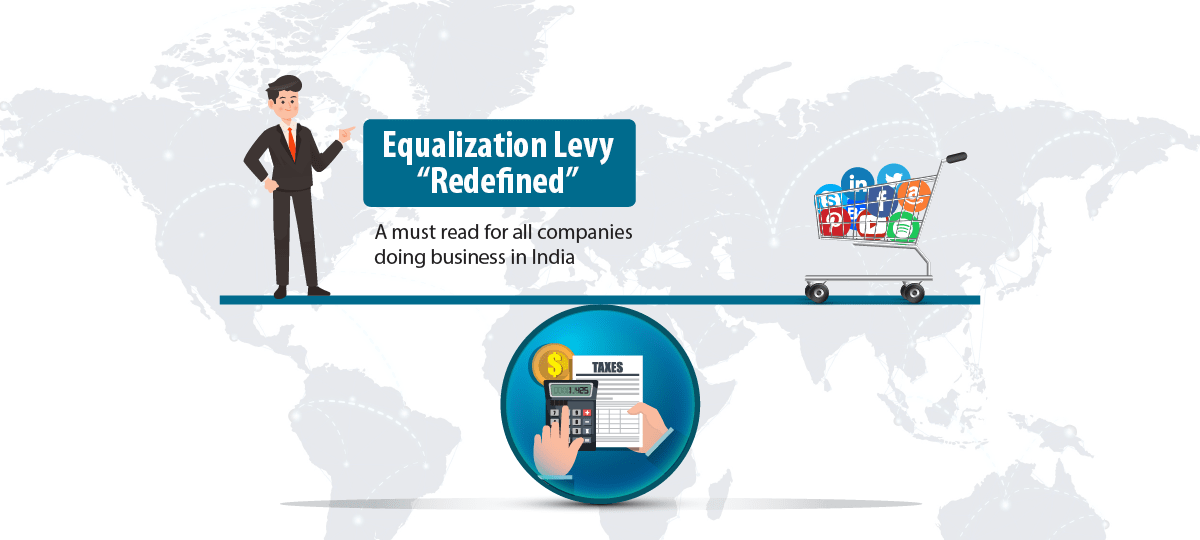The Equalisation Levy was first introduced in the country by the Finance Act of 2016, with the primary goal of levying taxes to digital transactions and the income accruing to foreign e-commerce companies from India. It was charged at 6% on certain online advertising as well as other related services. However, the Finance Act, 2020 has amended its predecessor, and has thus, introduced a new Equalisation Levy, which will be charged at 2% on the following e-commerce transactions:
- Online sale of goods owned by the e-commerce operator
- Online sale of services provided by the e-commerce
- Online sale of goods or services or both, which are facilitated by the e-commerce operator
- One or more combinations of the abovementioned activities
The Equalisation Levy is an application on the remuneration received by an e-commerce operator on the above transaction from someone who is:
- A resident of India
- A non-resident of India, where:
- The advertisement that targets a customer who is an Indian resident, or a customer with an IP address in India
- The sale of data that is collected is from an Indian resident or has an Indian IP address
- The person who buys the goods or services uses an Indian IP address
To put simply, this levy is made on online sales made by or through a non-resident e-commerce operator.
What are the features of the new Equalisation Levy?
Some of the salient features of the new Equalisation Levy include:
- Non-resident e-commerce operators are responsible to pay the levy
- For any non-payment, the non-resident will be liable to pay an interest of 1% per month
- For non-payment, the non-resident will also be liable to pay a penalty that is equal to the amount of the levy that has been unpaid
- This penalty shall only be waived off if the non-resident e-commerce operator proves a reasonable and just cause for the failure of the payment
It is important to note that since the Equalisation Levy has been introduced through the Finance Act and not the Income Tax Act, any amount paid by the non-resident e-commerce operator shall remain cost to him. Furthermore, this cost shall not be eligible for any credit in the operator’s country of residence.
What is not included under the new Equalisation Levy?
The Levy does not apply if:
- The e-commerce operator has a permanent firm in India, and if the e-commerce goods or services are connected with the permanent firm/establishment
- The transactions are covered by the Equalisation Levy which is under the Finance Act 2016
- If the sales from the goods or services is below INR 20 million during a tax year
What is the take of other countries on the new Equalisation Levy?
Major businesses across the globe have expressed their concerns regarding the new Equalisation Levy. They are of the opinion that the time period offered to them to comply with the new levy is rather short. They are also concerned about keeping track of their IP addresses in India.
However, taking a note from India, other countries around the world gave also introduced tax levies on digital transactions.
How is the levy affecting students studying in foreign institutions?
Given the current situation of the pandemic, many Indian students have been seeking education from foreign colleges, universities or institutions. With online and digital classes being taught, these foreign universities have Indian IP addresses for seamless teaching.
In that case, there arises a question whether the temporary provision of such online educational facilities to Indian students fall within the provisions of the new Equalisation Levy or not. While many may consider that it does, the facilities may not actually fall within the scope of the new EL provisions due to the following reasons:
- The new EL provisions would apply only if the total fees collected by foreign universities for providing temporary online education crosses a total limit of INR 20 million for every individual educational institution during the fiscal year of 2020-21
- Furthermore, the limit will have to be calculated for each educational institution individually, where only the fees collected from an Indian resident will be considered
- The institutions do not own, manage or operate any digital or electronic facility for the online sale of services, and use online facilities or platforms provided by third-party vendors only
- This way, they do not fall within the basic definition of an e-commerce operator as mentioned in the new Equalisation Levy
- These institutions are purely educational and provide education to students only through traditional methods, and that the online education facility is only temporary




